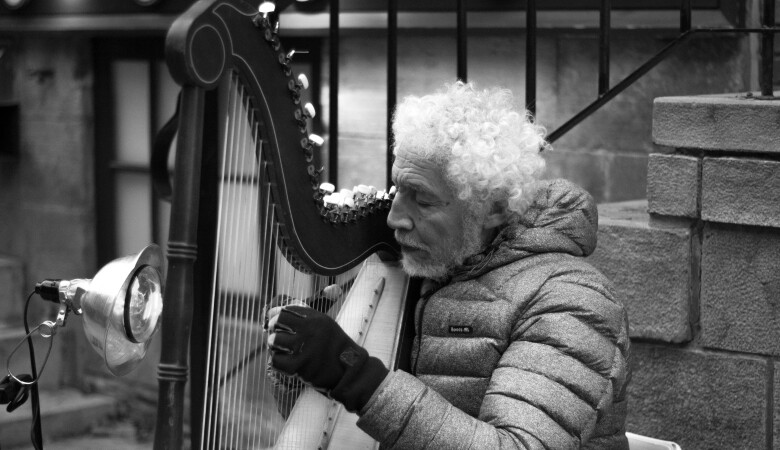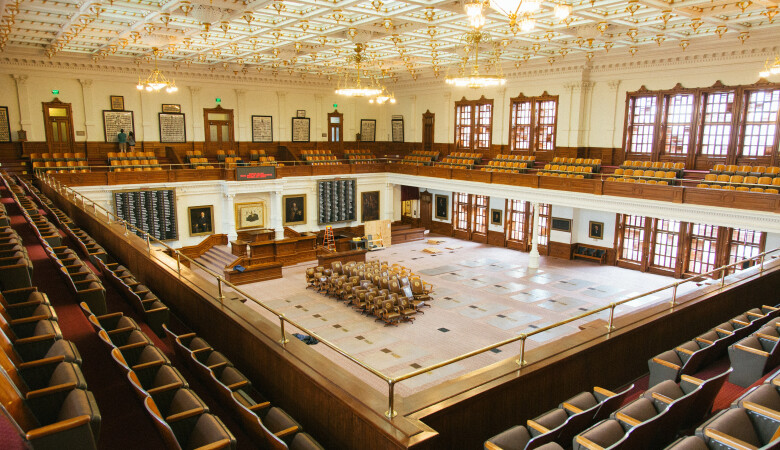The Most Important Question in History (Matthew Sermon 76 of 151)
May 06, 2007 | Andy Davis
Matthew 16:13-20
Introduction
In our text today we come to the central question of all human history, and I contend it's a central question of the history of your soul. All of us stand before this question, and we must give an answer. Who was Jesus of Nazareth? What do you say about him? Who was he? We have the person of Christ standing in the text and confronting us today. And we have also, a word of great blessing, the greatest blessing in my life. The blessing of being able to make Peter's confession, "You are the Christ, the Son of the living God." Jesus, speaking over anyone who can make that confession from their heart, "Blessed are you, for this was not revealed to you by man, but by my Father in Heaven." We have this great question and this great blessing.
Some time ago, James Hefley wrote a well-known paragraph, marveling over the person of Christ. It's familiar to some of you I think, entitled, “One Solitary Life.” He said, "Here is a man who was born in an obscure village, the child of a peasant woman. He worked in a carpenter shop until he was 30 and then for three years, he was an itinerant preacher. He never wrote a book. He never held an office. He never owned a home. He never had a family. He never went to college. He never put his foot inside a big city. He never traveled more than 200 miles from the place where he was born. He never did one of the things that usually accompany greatness; he had no credentials but Himself. He had nothing to do with this world except the naked power of his divine manhood. While still a young man, the tide of popular opinion turned against him. He was turned over to his enemies, he went through the mockery of a trial, he was nailed to a cross between two thieves. His executioners gambled for the only piece of property he had on earth while he was dying and that was his coat. When he was dead, he was taken down and laid in a borrowed grave through the pity of a friend. Such was his human life. He rises from the dead. Nineteen centuries have come and gone, and today he is the centerpiece of the human race. I am within the mark when I say that all the armies that ever marched, all the navies that ever were built, all the parliaments that ever sat and all the kings that ever reigned put together have not affected the life of man upon this earth as powerfully as has that one solitary life."
Napoleon Bonaparte said this about Christ, "I know men and I tell you that Jesus Christ is no mere man. Between him and every other person in the world there is no possible term of comparison. Alexander, Caesar, Charlemagne and I have founded empires, but on what did we rest the creation of our genius? Upon force. Jesus Christ founded his empire upon love and at this hour millions of men would die for him." Who was Jesus of Nazareth? Who was he? I can't actually ask the question that way. As a believer I have to say, "Who is he?" because I believe he's alive. But you have to answer the question for yourself. Who was this man, Jesus of Nazareth? I say to you, it's the most important question you will ever answer.
Look at verses [Matthew 16]13 through 15 and try to understand what happens here in the text. "When Jesus came to the region of Caesarea Philippi, he asked his disciples, 'Who do people say the Son of Man is?' and they replied, 'Some say John the Baptist, others say Elijah and still others Jeremiah or one of the prophets.' 'But what about you,' he asked. 'Who do you say that I am?'" We live in a world full of questions, some of them are trivial and inconsequential, some of them are very important. For example, if you go to see a doctor, he may probe with questions to get a diagnosis. Where does it hurt? How long have you had the pain? Are you taking on any other medications? Trying to gain information so he can make an accurate diagnosis. A 911 operator will ask what is the nature of your emergency? Is the break-in still in progress? That's an important question. Is the patient still breathing? Perhaps an even more important question. What is your address? Some of you are students, maybe you're about to face a professor's probing final examination and 50% of your grade will depend on your ability to trace out the sociological development of American industry after the industrial revolution and all of the ways that it connects to the 20th century and blah, blah, blah, blah, blah. I can't keep it going.
Some of you will, in the next year, be sitting for the SAT and you'll have to be good at math and you'll have to be good at English and you'll have to write an essay. Those will be important questions because it may determine where you go to college, or if you go to college at all. Somewhere in the Triangle region, a young man may get down on one knee and face a beautiful young lady and he may pop the question. For her that will end up being one of the most important questions she ever answers in her life. Will you marry me? A witness about to give testimony in a court room has to answer this: "Do you swear to tell the truth, the whole truth and nothing but the truth?" A very important question. There are deeper questions that face all of us day by day. Who am I, why am I here? What will happen to me when I die, is there life after death? What is the meaning of life? These are significant questions.
In the midst of all of these important questions, we live in a world full of opinions. I don't think you've ever been able to access other people's opinions so easily as today, all you have to do is go on the Internet and read a blog. There's something called the blogosphere. You can live there, and you can just marinate in other people's opinions on all of these questions if you want to spend your time that way. You can, actually even venture some of yours on it, and maybe some people will read them. You can have any question answered, if you type it into certain lines, they'll give you an answer. Should I quit my job? Should I refinance my house? You can go to the internet and to get your answer. But I say to you in this world full of important questions and swirling opinions, this is the most important question you will ever answer: who do you think that Jesus of Nazareth was? Or more directly from the text, Jesus stands in front of you, I believe, through the Spirit, and says, "Who do you say that I am?" According to the Bible, whether you spend eternity in heaven or hell depends on your heart answer to that question.
Jesus: “Who Do People Say That I Am?”
Now, look at the context. Jesus is in Caesarea Philippi. It's located 25 miles northeast of the Sea of Galilee, 40 miles southwest of Damascus. It's on a beautiful plateau near the head waters of the Jordan river. Nearby, a few miles to the north, is Mount Herman. Generally snow-covered, beautiful, over 9000 feet tall, dramatic. Caesarea Philippi was originally named Paneas, after the Greek god of nature, Pan, who according to Greek mythology was born in a cave nearby. Caesar Augustus gave the region to Herod the Great who bequeathed it to his son, Philip, who named it after Caesar Augustus, and also after himself. Thankfully he put Caesar first, a good idea in those days — Caesarea Philippi. It's a few miles from the northern city of Dan, and therefore it's a bit of a crossroads where Jewish culture mingles with Gentile culture; therefore, cosmopolitan in its outlook with an ebb and flow of opinions. Jesus goes there, I believe, to retreat from the maddening crowd and from the increasing and the escalating pressures of his ministry. Huge crowds were constantly pressing him, yearning for physical healings. People wanted to take him, after the feeding of the 5000, by force and make him King. Herod probably wanted to kill him. The Scribes and Pharisees definitely wanted to kill him. It’s an escalating pressure, and Jesus backs off to spend some time in retreat with his disciples. We know that first he went to Tyre and Sidon, but that wasn't quiet for long, after Jesus heals the Syrophoenician woman, so he goes to this mountain retreat.
He wants to spend some quality time with his disciples, He wants to pour Himself into them. It was central to his strategy to build into the lives of these 12 men, so that they would take what they had seen in him and learned from him and preach it to the ends of the earth. He wants to spend time with them, and He gets right down to brass tacks immediately. Verse 13, "When Jesus came to the region Caesarea Philippi, He asked his disciples, ‘Who do people say the Son of Man is?’” He's asking for a survey of opinions on this important question. “What are they saying about Me?” He uses this title "Son of Man”; it was Jesus' most common self-designation. As a matter of fact, He's the only one who calls Himself the Son of Man, but He called himself that frequently, over 30 times in Matthew's Gospel. I believe, definitely, He got the title from Daniel chapter 7, that magnificent Son of Man vision that Daniel had. In his vision, he saw one like a son of man approaching the Ancient of Days, Almighty God, and coming into his presence. He receives from him glory, authority and sovereign power and all peoples and nations and men of every language worshipped and served him. It's a vision of someone who is not the one seated on the throne but, like Revelation 5, comes into the presence, and he's one like a son of man. I believe Jesus called Himself Son of Man to focus in on this perplexing issue of how one can be both Son of Man and receive this kind of worship in adulation and glory from Almighty God. It's the mystery of the incarnation and Jesus focuses on it with this title, Son of Man. The title emphasized both the deity and the humanity of Christ.
There are wide ranging opinions. Some people said that he was John the Baptist risen from the dead, that's what Herod thought, a bit difficult since their lives overlap so much. It’s hard to be in two places at once and so that really is impossible. But there it is. They thought that somehow John the Baptist had risen from the dead. Others said he was Elijah, who as you know, ascended to heaven in a chariot of fire. The legend was that he would come back in, perhaps in equally dramatic way, and perhaps Jesus was Elijah coming back from heaven. Some people thought he was Jeremiah. A popular legend was that at around the time of the fall of Jerusalem to Babylon, that Jeremiah hid the Ark of the Covenant and that at a certain point, he would come back and restore the ark and worship would begin again. There's nothing of that in the Bible, but there's a legend concerning that. Others just didn't know, one of the prophets, they said. It’s a wide-ranging base of opinions here. This is a common theme, that the answers fall infinitely far short of the truth. You see, Jesus is God the Son. Through him all things were made. He is the infinite God. He is before all things and in him all things hold together. He's the image of the invisible God, the first-born over-all creation. That's who Jesus is. But these answers all come short. They fall short of who Jesus really was. This is common, over and over. People want to praise Jesus faintly and say good things about him, short of that he's God in the flesh. Benjamin Franklin, for example, said this, "As to Jesus of Nazareth, my opinion is I think the system of morals and his religion as he left them to us, is the best the world ever saw or is likely to see, but I apprehend that it has received various corrupt changes over time. I have, with most of the present dissenters in England, some doubts as to his divinity. Though it is a question I do not dogmatize upon, having never studied it.” Friend, study it. Study whether he's God or not, it's very important. Franklin said he never found the time to study it and it was needless to busy himself with it, when I expect soon an opportunity of knowing the truth with less trouble. Oh, he knows the truth. We ought to make this the study of our lives, friend. Who was Jesus of Nazareth? We have to find out whether he's God or not.
It is true that at a point everyone will see him, even those who pierced him. But at that point, all the nations of the earth will mourn because of him. Too late, as we've mentioned, for Benjamin Franklin. Albert Einstein put it this way, "As a child I received instruction in both the Bible and in the Talmud. I am a Jew, but I am enthralled by the luminous figure of the Nazarene. No one can read the Gospels without feeling the actual presence of Jesus, his personality pulsates in every word. No myth is filled with such life." Well, those are words of praise far short of He is God in the flesh. French atheist Ernest Renan said this, "Jesus was the greatest religious genius who ever lived." That's not going to save your soul. German rationalist, Strauss, put it this way, "Jesus is the highest model of religion." John Stewart Mill, a philosopher, called Jesus the guide of humanity. Transcendentalist philosopher, Ralph Waldo Emerson put it this way, "Jesus belong to the race of prophets, he saw with open eyes the mystery of the soul. One man was true to what is in you and me, and that is Jesus. He is, I think, is the only soul in history who has appreciated the worth of man." Fine words. Mikhail Gorbachev said Jesus was the first socialist, the first to seek a better life for mankind. Most commonly people who don't believe in Jesus call him a good moral teacher. Jesus is infinitely more than a luminous figure, a religious genius, the highest model of religion, the guide of humanity, of the race of prophets, the first socialist seeking a better life for mankind or a good moral teacher.
C.S. Lewis, in his classic Mere Christianity, talked about this quite directly in his “Lord, Liar, Lunatic” trilemma. You've heard it before, but bears quoting again. He says, "I'm trying here, to prevent anyone saying the really foolish thing that people often say about him. I'm ready to accept Jesus as a great moral teacher, but I don't accept his claim to be God. That is the one thing we must not say. A man who was merely a man and said the sort of things Jesus said would not be a great moral teacher, he would either be a lunatic on the level of a man who says he is a poached egg, [that's my favorite line] or else he would be the devil of hell. You must make the choice. Either this Man was and is the Son of God, or else he's a mad man and something worse. You can shut him up for a fool, you can spit at him and kill him as a demon, or you can fall at his feet and call him Lord and God but let us not come up with any patronizing nonsense about his being a great human teacher. He has not left that open to us; he did not intend to."
So, who was Jesus of Nazareth? Jesus forces us to declare, He forces us to study it, He forces us to make a statement about this issue. Now, our opinion doesn't change the fact either way. If you think he is only a great moral teacher, and not the Son of God, it will not change his nature and it will not get him down off the throne, but it's very important for your soul. Infinitely so. Other subjects we could study don't force this kind of a commitment. We don't have to learn and make a commitment on biology or geometry or ecology or any of these things, but Jesus forces us to fly, to fly our flag. Same is true of biographies. You can go through and study the life of Alexander the Great or Napoleon or any of these men that I've quoted and make a claim of commitment one way or the other, you can just study them and just move on. It's just a topic.
Jesus brings you to a fork in the road. You must make a choice. You must either worship him as God or you must reject him entirely. He doesn't leave you a middle of the road option. The statements that C.S. Lewis is referring to are astonishing. Jesus doesn't say, “I teach the truth,” or “I am a guide to the truth.” He says, "I am the truth." He says, "I am the way, and the truth and the life. No one comes to the Father except through me." More than anything, Jesus of Nazareth confronts us with his deity, and we must make a decision about it. His life is bracketed by two miracles: the virgin womb and the empty tomb. Peter Larson once said, "Jesus entered or our world through a door marked, "No Entrance" and he left through a door marked,” No Exit." It's quite striking, isn't it? The twin miracles, the beginning and the end of Jesus' life, they proclaim his deity.
This is a question and there is a right answer. I know that some of us like Calvin in Calvin and Hobbs say, "All that emphasis on right and wrong answers, makes me feel stupid.” We want to say that every answer is the right answer. We're going to accept any answer. Jesus doesn't accept any answer. We are a tolerant people, we delight in tolerance, but here is a right answer to this question, and Peter gave it. Look what it says in Verse 15 through 17, “‘What about you?’ He asked, ‘Who do you say that I am?’ Simon Peter answered, ‘You are the Christ, the Son of the living God.’ And Jesus replied, ‘Blessed are you Simon, son of Jonah, for this was not revealed to you by man but by my Father in Heaven.’” In verse 16, we have the right and true answer, "You are the Christ, the son of the living God." This is Simon Peter's saving confession. Out of the fullness of his heart, Peter spoke, and he went far beyond all of these small current opinions about Jesus. He had seen Jesus' astounding miracles, a river of them, one after the other. He had heard Jesus' astounding words. Earlier, he had said to Jesus, "You have the words of eternal life, you alone have the words of eternal life." So, he'd heard his teachings. He had seen the perfection of Christ's character, how he handled difficult encounters with hate-filled sinners one after the other and dealt with every single one of them with perfect love, perfect character, holiness, humility every single encounter. Every word perfectly spoken. He saw him dealt with issues with great courage, he saw his perfect character. With all of that evidence, even with all of that evidence he still needed a miracle. I'm talking about Simon Peter. He still needed a miracle worked on his own heart in order to confess that Jesus was the Christ, the son of the living God.
I don't want you to think that Peter's confession is like a magic word formula you have to say, "You are the Christ, the Son of the living God." It doesn't have anything to do with the words, it has to do with the truths behind the words. There are actually many such confessions in the New Testament. Nathaniel in John Chapter 1, said, "Rabbi, you are the son of God, you are the king of Israel." That's a saving confession. At the end of John's gospel, doubting Thomas is doubting no longer and he falls, I think, in front of Jesus and says, "My Lord and my God." That's a saving confession. Mark, 15:39, the centurion who stood there in front of Jesus, heard his cry, saw how he died and said, "Surely this man was the son of God." If he believed it in his heart, that's a saving confession. Even Peter had a different way of saying it at another time, "We believe and know that you are the holy One of God.,” a saving confession. The key element is a recognition that this man is God, that he is God in the flesh and no less.
Our Recognition of Who Christ is Comes from God’s Revelation to Us
As I've already mentioned this fact can only be believed by direct revelation of God the Father to your heart. It's the only way you will come to this conclusion. Look what he says in verse 17, Jesus replied, "Blessed are you, Simon, son of Jonah, for this was not revealed to you by man but by my Father in Heaven." Salvation is God's work from beginning to end, from first to last, he is the Alpha and the Omega of our salvation. He works it in us and, except a person receive direct revelation from God the Father, you will never make Peter's saving confession, it is actually impossible. Jesus did tremendous miracles in front of Jewish leaders and they never believed. Jesus healed people of paralysis and fed huge crowds of people, and they didn't believe in him. The miracles alone, the evidence of the miracles alone is not enough. Rather Christ must be directly revealed to your heart by God the Father.
It's interesting to me, that Jesus entered the world to reveal God the Father to us. He says in John 14, "Anyone who has seen me has seen the father. Don't you know me, Philip after I've been with you all this time?" You look at Jesus, you see the Father, but it's only by the administrations of the Father, that you'll see Jesus properly. Do you see it? It says in Matthew 11:27, "No one knows the Son except the Father. And no one knows the Father, except the Son and those to whom the Son chooses to reveal him." Do you see the revelation? Jesus reveals the Father to us, the Father reveals Jesus to us. But I say this, without this direct supernatural work of God on your heart, you will never believe. Never. So, it says, "Blessed are you Simon, son of Jonah." This is the greatest blessing in my life to have, Second Corinthians 4:6, "The light of the knowledge of the glory of God in the face of Christ, shining in my heart and the light shines in the darkness and the darkness cannot extinguish it." Amen. The light of the knowledge of the glory of God shines in the heart of any born-again person and regenerate person. It's a light that God kindles, God the Father concerning his own son. In Christ, we see the perfections of God, and blessed are you if that's happened to you. "Blessed are you, Simon, son of Jonah." What does “blessed” mean? It means happy, in a way you can't even imagine. Happy, like the world cannot make you happy. It means eternally, perfectly happy in the presence of God. You have just now the foretaste of the blessedness that comes from making this confession. This is the greatest blessedness that there is.
During the first “Great Awakening” Jonathan Edwards wrote a sermon with a typically obtuse and difficult title; something like this: “Divine Supernatural Light Revealed Directly to the Human Heart, a Rational and Correct Doctrine.” Basically, what it means is that it is right for us to expect God to reveal things directly to our hearts based on the word of God. He's coming right out of this text, "Blessed are you, for this was not revealed to you by man but by my Father in heaven." You must see in the face of Jesus of Nazareth, almighty God. God the Son. You must see it in this man who lived so many years ago, who lived that one solitary life, in order to be saved. The only way you can do it is if God the Father works it in you. I could preach for the next hour, I could preach with great eloquence. I could preach with great simplicity; I could stop right now. I could preach for another three hours. It wouldn't matter. The technique of communication doesn't matter. What matters is that God speaks directly to your heart, as you're hearing the Gospel preached, that's what matters.
Apart from this work, we are lost, we were dead in our transgressions and sins, without hope and without God in the world. This saving revelation saved Peter's soul, and it was the first clear revelation of Jesus' deity made in Matthew's gospel; a clear statement and an important moment. Next week with God's help, according to the will of God, if we have the opportunity, I'm going to preach on the church and the doctrine of the church. I want to give you a brief overview of what we're going to see now. Based on Simon Peter's confession, God has orchestrated a huge church. Look what it says in Verse 18 and 19, "I tell you that you are Peter, and on this rock, I will build my church and the gates of Hades will not overcome it. I will give you the keys of the kingdom of heaven and whatever you bind on earth will be bound in heaven and whatever you loose on earth will be loosed in heaven." The foundation of Christ’s church is the apostles and prophets with Christ Jesus himself as chief cornerstone. In their testimony to the saving work of Christ, we find our salvation. We would not have the New Testament if it were not for these eyewitnesses, who had their eyewitness testimony written down. On the basis of this, we know Jesus, we hear the gospel, and we are able to listen and to believe. On that rock He founded the Church, but since then the church has been making progress. Jesus said, "I will build my church and the gates of Hades will not prove stronger than it." It has progressed. There is now a multitude greater than anyone can count, from almost every tribe, and language, and people, and nation. That is the drive of the missionary endeavor in this world. That people from every tribe and language and people and nation, would confess that Jesus is the Christ, the son of the living God, that is the church that Christ is building. And that church has authority, "I will give you the keys of the kingdom of heaven and whatever you bind on earth, will be bound in heaven. Whatever you loose on earth will be loosed in heaven." It has to do with the authority of the church within the walls of the church to deal with its doctrines, and its life, and its practices, appropriately, to order itself for mission and to deal with church discipline, to keep itself pure and holy. Outside the walls of the church, to proclaim based on this gospel whether other people sins are forgiven or not. What a grave responsibility that is.
Finally, it says, "The gates of Hades will not prove stronger than it." — future triumph, future conquest. The gates of Hades, I think, representing both Satan's wicked dark kingdom and its power of death, and then death itself, which will someday be thrown into the lake of fire. Amen and Amen. The death of death. Death will not hold us back, cannot bar us in but we will most certainly be raised to life, and we will live forever and ever. That is the nature of the future triumph of the church. It's not going to come lightly or easily. There's a march of suffering that's still ahead of us, but this is how Christ will build his church. You see that the foundation of it is an individual personal confession of faith in Christ. That's how the whole thing is built. Just as the universe is built out of atoms, so the church is built one living stone after another. Each one of them individually making that confession of Christ.
Application
Have you made that confession today? I prayed this morning that God would bring someone here today who had not made yet that confession, and that they would make that confession today, that they would see in the death of Jesus Christ, in his blood shed on the cross, an atoning sacrifice for sin their own salvation. That they would acknowledge that they have sinned, that they have transgressed the law of God, and that they have no hope of salvation apart from Jesus. That they would cling to Jesus, and they would see in Christ, deity. Not merely a good moral teacher, or a guide for humanity, but God, who willingly laid down his life. Are you that person? Have you made that saving confession yet? Don't leave this room without making that confession. Confess in your heart, "Jesus you are Lord. You are my savior; I trust in you." For the rest of you who have already made that confession, do you realize how blessed you are? Do you realize that Christ's word of blessing for Simon Peter stands over you and blesses you too? Do you realize that you would not be able to make that confession if God had not worked it directly in your soul by the power of the Holy Spirit? Do you realize that He knew you by name, He called you by name and you are his and He will never let you go? I'm hoping that your problems that you carried into this place, this morning, are shrinking into insignificance as you listen to this. The blessing of God swallows them all. You're going to live with him forever and ever in his presence. You are his and he is yours. Blessed are you. Confess and say, "You know, it's not through my own good works, it's not because I'm such a good believer, or such a good repenter or such a good faithful person. No, it's because He was gracious to me, because God the father revealed it to me, that's why." All praise and glory go to him.
It is true that God intends for us to have a role to play. “How can they call on the one they've not believed in? How can they believe in the one of whom they have not heard? And how can they hear without someone preaching to them? And how can they preach unless they are sent?” As it is written, "How beautiful are the feet of those who bring good news?" Consequently, faith comes by hearing the message. The message is heard through the word of Christ. Let's be God's fellow workers, let's be his ambassadors, as though God himself were making his appeal through us. Find somebody at the workplace, find a neighbor who's not made the saving confession yet and share the gospel with them. God will use it. The whole time, you know that if it happens, it's only by the direct revelation of God the Father to that person's heart. Trust in him for that.
One final thing, do you realize that God isn't done? I'm speaking to you believers now; God isn't done revealing Jesus to you. Do you have enough of Jesus, have you learned enough of him? Can we close that file and put it aside and study something more worthy now? Can that ever happen? Will it happen in eternity? When you get to a point when you've been there 10,000 years, bright, shining as a sun, that you've learned enough about Jesus? This is an infinite topic and infinite is the father's commitment to tell you about it. He will never tire of teaching Christ to you. For all eternity, you will study him and with Paul, you will continue to say what he says, in Philippians 3, "I want to know Christ, I want to know him." And as it says in Isaiah 9, "A great mystery of the increase of his kingdom and peace. There will be no end." I mean to eternity. Forever Christ will be increasing within you. Look forward to it, you're blessed. Your blessings are still infinitely yet to come.






























